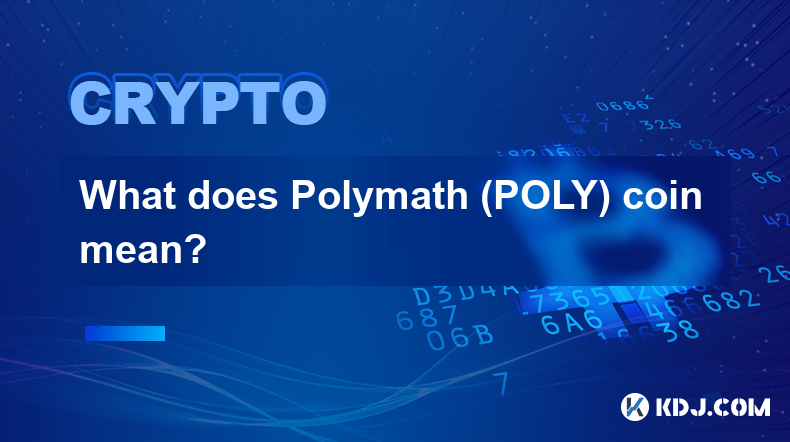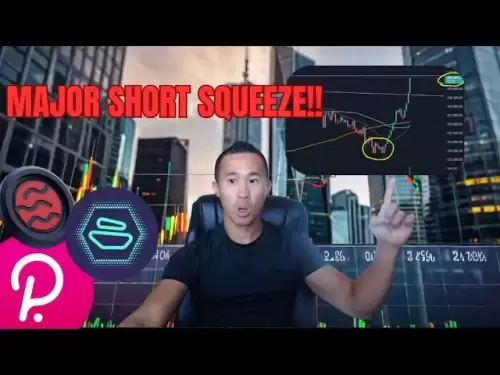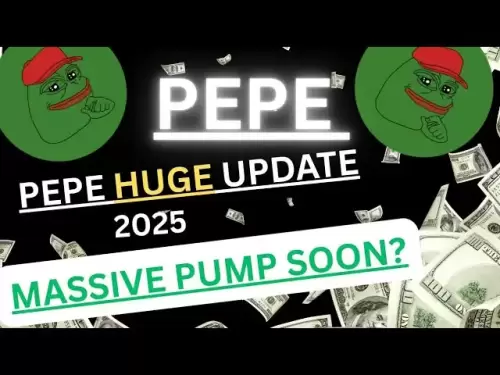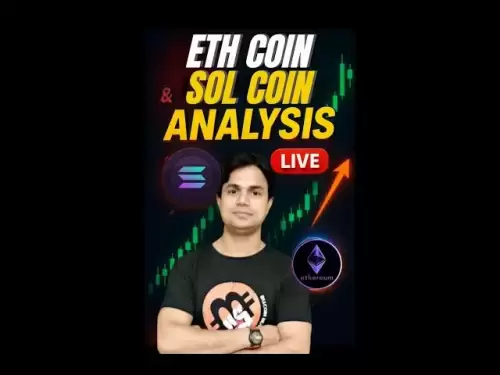-
 Bitcoin
Bitcoin $109,459.7682
2.44% -
 Ethereum
Ethereum $2,598.6052
6.29% -
 Tether USDt
Tether USDt $1.0003
0.00% -
 XRP
XRP $2.2734
3.95% -
 BNB
BNB $661.4886
1.58% -
 Solana
Solana $155.4825
4.35% -
 USDC
USDC $0.9999
-0.02% -
 TRON
TRON $0.2838
1.04% -
 Dogecoin
Dogecoin $0.1740
8.25% -
 Cardano
Cardano $0.6047
9.04% -
 Hyperliquid
Hyperliquid $40.2302
6.50% -
 Sui
Sui $2.9863
10.05% -
 Bitcoin Cash
Bitcoin Cash $509.5786
0.60% -
 Chainlink
Chainlink $13.8156
6.03% -
 UNUS SED LEO
UNUS SED LEO $9.0142
0.69% -
 Avalanche
Avalanche $19.0337
8.68% -
 Stellar
Stellar $0.2438
5.17% -
 Toncoin
Toncoin $2.9012
3.59% -
 Shiba Inu
Shiba Inu $0.0...01210
6.20% -
 Litecoin
Litecoin $90.0882
7.05% -
 Hedera
Hedera $0.1597
8.53% -
 Monero
Monero $326.3340
2.88% -
 Polkadot
Polkadot $3.6365
9.32% -
 Bitget Token
Bitget Token $4.6162
2.72% -
 Dai
Dai $1.0001
0.00% -
 Ethena USDe
Ethena USDe $1.0002
-0.01% -
 Uniswap
Uniswap $7.6403
10.47% -
 Pepe
Pepe $0.0...01060
12.03% -
 Aave
Aave $281.3664
7.56% -
 Pi
Pi $0.4992
1.76%
What does Polymath (POLY) coin mean?
Polymath's decentralized platform facilitates the creation and issuance of security tokens, bridging the gap between traditional finance and the crypto world while ensuring regulatory compliance and enhancing capital market accessibility.
Jan 08, 2025 at 01:36 am

Key Points:
- Decentralized Security Token Platform: Polymath enables the creation and issuance of security tokens, representing ownership or rights in assets, on the blockchain.
- Regulatory Compliance: Polymath addresses legal and regulatory complexities by providing a platform compliant with relevant securities laws in various jurisdictions.
- Tokenization of Real-World Assets: Polymath allows tokenization of real-world assets such as stocks, bonds, and real estate, making them accessible to a wider investor base.
- Broad Industry Applications: Polymath's solutions cater to a range of industries, including real estate, finance, healthcare, and entertainment.
- Strong Team and Partnerships: Polymath's team comprises seasoned professionals with expertise in finance, technology, and law. They have strategic partnerships with industry leaders in compliance, asset management, and tokenization.
What is Polymath (POLY) Coin?
Polymath is a decentralized security token platform that empowers businesses and issuers to create, issue, and manage security tokens on the blockchain. Its core mission is to bridge the gap between traditional finance and the decentralized world of cryptocurrencies, enabling efficient and accessible capital markets.
How Does Polymath Work?
1. Security Token Creation:
- Issuers leverage Polymath's platform to create security tokens that represent ownership or rights in specific assets or entities.
- The tokens are designed to adhere to regulatory requirements and provide investors with the desired level of protection.
2. Regulatory Compliance:
- Polymath integrates with Polymesh, a purpose-built blockchain specifically designed for security token issuance and trading.
- Polymesh ensures compliance with securities regulations, including exemptions, custody, and reporting mechanisms.
3. Token Issuance and Distribution:
- Polymath facilitates the distribution of security tokens to a qualified investor base.
- Issuers can choose to conduct token sales through private placements, public offerings, or other methods.
4. Secondary Market Trading:
- Polymath provides support for secondary market trading of security tokens.
- Regulated exchanges and over-the-counter (OTC) platforms integrate with Polymesh to enable seamless transactions.
5. Investor Protection:
- Polymath's platform incorporates mechanisms to protect investors, such as identity verification, investor accreditation verification, and trading restrictions.
- It also supports automated compliance checks to ensure adherence to regulations.
Applications and Benefits of Polymath
- Real-World Asset Tokenization: Polymath enables the tokenization of assets such as stocks, bonds, real estate, and commodities, making them more accessible and liquid.
- Alternative Investment Opportunities: Security tokens unlock new investment opportunities for investors, allowing them to diversify portfolios with non-traditional assets.
- Cost Reduction and Efficiency: By issuing security tokens on the blockchain, issuers can streamline processes, reduce intermediary fees, and improve operational efficiency.
- Increased Capital Access: Security tokens provide issuers with alternative sources of capital, potentially reducing reliance on traditional financial institutions.
- Transparency and Trust: The blockchain provides immutable records of security token transactions, promoting transparency and accountability.
Frequently Asked Questions (FAQs)
Q: What is the role of the POLY coin in the Polymath ecosystem?
A: POLY is the native utility token of the Polymath platform. It is used for various purposes, including paying transaction fees, powering the Polymesh consensus mechanism, and incentivizing platform participation.
Q: Is Polymath regulated?
A: Polymath is compliant with relevant securities regulations in various jurisdictions. It leverages Polymesh, a dedicated security token blockchain that incorporates legal and regulatory safeguards.
Q: What types of assets can be tokenized using Polymath?
A: Polymath supports the tokenization of various real-world assets, including stocks, bonds, real estate, commodities, intellectual property, and more.
Q: How does Polymath ensure investor protection?
A: Polymath incorporates mechanisms such as identity verification, investor accreditation verification, and trading restrictions to safeguard investors. It also integrates automated compliance checks to monitor regulatory adherence.
Disclaimer:info@kdj.com
The information provided is not trading advice. kdj.com does not assume any responsibility for any investments made based on the information provided in this article. Cryptocurrencies are highly volatile and it is highly recommended that you invest with caution after thorough research!
If you believe that the content used on this website infringes your copyright, please contact us immediately (info@kdj.com) and we will delete it promptly.
- Meme Coin Mania: Is BTC Bull the Next Big Thing in a Limited Time BTC Bull Run?
- 2025-07-03 12:30:11
- Bitcoin Soars to $109,000: What's Fueling the Crypto Rally?
- 2025-07-03 10:30:13
- Splatterhouse Rocks Retro Scene: A UK Magazine Deep Dive
- 2025-07-03 12:30:11
- Bitcoin, the Senate Bill, and $107K: A Wild Ride on Capitol Hill
- 2025-07-03 12:50:11
- Chainlink's Chart Patterns Hint at a Big Move: Decoding the LINK Price
- 2025-07-03 10:50:12
- Shiba Inu, Solana Uptrend, Bitcoin Breakout: Decoding the Crypto Buzz
- 2025-07-03 10:50:12
Related knowledge

How to customize USDT TRC20 mining fees? Flexible adjustment tutorial
Jun 13,2025 at 01:42am
Understanding USDT TRC20 Mining FeesMining fees on the TRON (TRC20) network are essential for processing transactions. Unlike Bitcoin or Ethereum, where miners directly validate transactions, TRON uses a delegated proof-of-stake (DPoS) mechanism. However, users still need to pay bandwidth and energy fees, which are collectively referred to as 'mining fe...

USDT TRC20 transaction is stuck? Solution summary
Jun 14,2025 at 11:15pm
Understanding USDT TRC20 TransactionsWhen users mention that a USDT TRC20 transaction is stuck, they typically refer to a situation where the transfer of Tether (USDT) on the TRON blockchain has not been confirmed for an extended period. This issue may arise due to various reasons such as network congestion, insufficient transaction fees, or wallet-rela...

How to cancel USDT TRC20 unconfirmed transactions? Operation guide
Jun 13,2025 at 11:01pm
Understanding USDT TRC20 Unconfirmed TransactionsWhen dealing with USDT TRC20 transactions, it’s crucial to understand what an unconfirmed transaction means. An unconfirmed transaction is one that has been broadcasted to the blockchain network but hasn’t yet been included in a block. This typically occurs due to low transaction fees or network congestio...

How to check USDT TRC20 balance? Introduction to multiple query methods
Jun 21,2025 at 02:42am
Understanding USDT TRC20 and Its ImportanceUSDT (Tether) is one of the most widely used stablecoins in the cryptocurrency market. It exists on multiple blockchain networks, including TRC20, which operates on the Tron (TRX) network. Checking your USDT TRC20 balance accurately is crucial for users who hold or transact with this asset. Whether you're sendi...

What to do if USDT TRC20 transfers are congested? Speed up trading skills
Jun 13,2025 at 09:56am
Understanding USDT TRC20 Transfer CongestionWhen transferring USDT TRC20, users may occasionally experience delays or congestion. This typically occurs due to network overload on the TRON blockchain, which hosts the TRC20 version of Tether. Unlike the ERC20 variant (which runs on Ethereum), TRC20 transactions are generally faster and cheaper, but during...

The relationship between USDT TRC20 and TRON chain: technical background analysis
Jun 12,2025 at 01:28pm
What is USDT TRC20?USDT TRC20 refers to the Tether (USDT) token issued on the TRON blockchain using the TRC-20 standard. Unlike the more commonly known ERC-20 version of USDT (which runs on Ethereum), the TRC-20 variant leverages the TRON network's infrastructure for faster and cheaper transactions. The emergence of this version came as part of Tether’s...

How to customize USDT TRC20 mining fees? Flexible adjustment tutorial
Jun 13,2025 at 01:42am
Understanding USDT TRC20 Mining FeesMining fees on the TRON (TRC20) network are essential for processing transactions. Unlike Bitcoin or Ethereum, where miners directly validate transactions, TRON uses a delegated proof-of-stake (DPoS) mechanism. However, users still need to pay bandwidth and energy fees, which are collectively referred to as 'mining fe...

USDT TRC20 transaction is stuck? Solution summary
Jun 14,2025 at 11:15pm
Understanding USDT TRC20 TransactionsWhen users mention that a USDT TRC20 transaction is stuck, they typically refer to a situation where the transfer of Tether (USDT) on the TRON blockchain has not been confirmed for an extended period. This issue may arise due to various reasons such as network congestion, insufficient transaction fees, or wallet-rela...

How to cancel USDT TRC20 unconfirmed transactions? Operation guide
Jun 13,2025 at 11:01pm
Understanding USDT TRC20 Unconfirmed TransactionsWhen dealing with USDT TRC20 transactions, it’s crucial to understand what an unconfirmed transaction means. An unconfirmed transaction is one that has been broadcasted to the blockchain network but hasn’t yet been included in a block. This typically occurs due to low transaction fees or network congestio...

How to check USDT TRC20 balance? Introduction to multiple query methods
Jun 21,2025 at 02:42am
Understanding USDT TRC20 and Its ImportanceUSDT (Tether) is one of the most widely used stablecoins in the cryptocurrency market. It exists on multiple blockchain networks, including TRC20, which operates on the Tron (TRX) network. Checking your USDT TRC20 balance accurately is crucial for users who hold or transact with this asset. Whether you're sendi...

What to do if USDT TRC20 transfers are congested? Speed up trading skills
Jun 13,2025 at 09:56am
Understanding USDT TRC20 Transfer CongestionWhen transferring USDT TRC20, users may occasionally experience delays or congestion. This typically occurs due to network overload on the TRON blockchain, which hosts the TRC20 version of Tether. Unlike the ERC20 variant (which runs on Ethereum), TRC20 transactions are generally faster and cheaper, but during...

The relationship between USDT TRC20 and TRON chain: technical background analysis
Jun 12,2025 at 01:28pm
What is USDT TRC20?USDT TRC20 refers to the Tether (USDT) token issued on the TRON blockchain using the TRC-20 standard. Unlike the more commonly known ERC-20 version of USDT (which runs on Ethereum), the TRC-20 variant leverages the TRON network's infrastructure for faster and cheaper transactions. The emergence of this version came as part of Tether’s...
See all articles

























































































